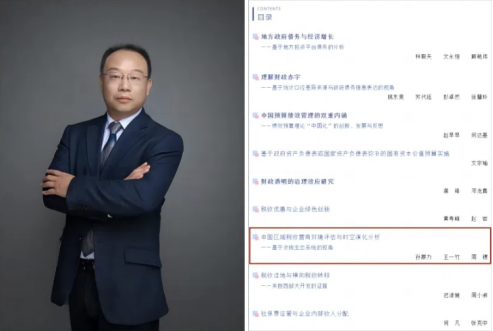
[Academic Journal] Public Finance Research, Issue 2, 2023.
[About the Author] Sun Qunli is a professor and doctoral supervisor at the School of Public Finance and Taxation of Zhongnan University of Economics and Law (ZUEL), with a Ph.D. in Economics. He now serves as deputy director of the Innovation and Talent Base for Income Distribution and Public Finance of the Ministry of Education and the Ministry of Science and Technology of China. He has long been engaged in the research of fiscal policy and fiscal theory, income and wealth distribution, invisible economy, etc. He has published numerous papers in journals such as Economic Research Journal, Journal of Management World, Public Finance Research. He has led and completed two projects funded by the National Social Science Fund of China, two projects funded by the Hubei Provincial Social Science Fund, and several other provincial and ministerial-level projects. His research achievements have won multiple national and provincial-level honors, including the first prize of the 6th Outstanding Achievement Award for Scientific Research in Colleges and Universities (Humanities and Social Sciences), the first prize of the Fifth National Outstanding Theoretical Research in Finance Award, the first prize of the Hubei Province Outstanding Research Award, and the Hubei Development Research Award.
[Main Views] The business environment is the soil in which enterprises survive and grow. A world-class tax business environment can stimulate market vitality and drive high-quality development. However, simply interpreting it as reducing tax costs may lead to a "bias toward deregulation." A good tax business environment should not only reduce the tax burden of enterprises, but also realize a benign interaction between taxpayers and tax collectors as well as a virtuous circle of taxation and economy. Therefore, merely discussing the interaction between tax authorities and taxpayers falls short of capturing the full picture of the tax business environment, which should be analyzed and deconstructed from a more macro and systematic perspective. Existing research has extensively explored institutional factors that affect the tax business environment, but few studies have analyzed the impact of macro factors such as economic and social conditions, as well as the influence of tax-related entities like taxpayer businesses and tax intermediaries on the tax business environment. Under the guidance of the ideology of collaboration, participation, and common interests, creating a first-class tax business environment should depend on the joint efforts of both taxpayers and tax collectors.
Policy Implications: (1) Promote collaboration and participation in tax collection and administration, and use flexible measures to complement strict enforcement. Encourage businesses to pay taxes with integrity, leading to a win-win outcome of tax-enterprise cooperation. (2) Strengthen the combination of effective market and proactive government, and give full play to the role of market factors such as tax intermediary industry in tax administration. (3) Optimize the top-level design of the tax system, appropriately increase the proportion of direct taxes, and improve the local tax system to provide fiscal support for the government in assisting businesses. (4) Encourage orderly competition among local governments, enhance tax services provided by the government, and strengthen integrity in governance. (5) Deepen inter-regional cooperation, especially the cooperation between provinces in the region, and continue to leverage the demonstration effect of a high-quality tax business environment.
